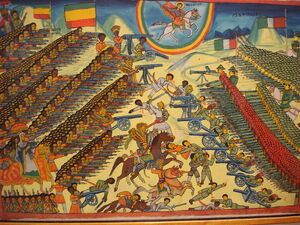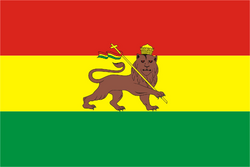Ethiopia is a regional power on the African continent played by Vilageidiotx. The Ethiopian government is still governed by it's traditional Imperial line, however in keeping up with the march of progress the Emperor shares power with a constitutional parliament. Ethiopian politics been focused primarily on affairs on the Ethiopian continent itself, and during the reign of Emperor Yohannes Iyasu the nation underwent rapid expansion as the colonial powers of Africa retreated in light of colonial rebellion and the prioritization of other political matters. With the death of Emperor Yohannes, his sons Sahle Iyasu and Yaqob Iyasu have entered into a civil war, with European powers supporting support the older Sahle and the Ethiopian military supporting the younger Yaqob. Ethiopia's diplomatic ties have been with Germany and Austria over the course of the twentieth century during they reign of Emperor Iyasu V, but in recent years those relationships have deteriorated with Yohannes's opposition to Europe and growing diplomatic ties with China. Yohanne's sons are split on this matter, with Sahle favoring Europe and Yaqob favoring China.
History
Ethiopian history goes back into ancient times to the Kingdom of Aksum, which the was considered one of the great powers of the late classical period[1]. Aksum was one of the first kingdoms to convert to Christianity as a whole, and eventually the Emperors would claim decendency from the biblical Solomon through the Queen of Sheba[2]. Ethiopian civilization survived contact with Islam, and the two religions eventually found themselves cooexisting relatively peacefully in comparison to other places where the two religions were mingled. Occasionally, however, conflicts broke out between Ethiopia and it's neighbors, and during one of these wars Ethiopia would receive help from Portugal, the empires first signifigant contact with Western Europe[3]. Through this contact, European technology would appear in the form of guns and fortification, but the relationship with Portugal would be cut when the Portuguese transplanted Jesuit missionaries into the Empire, leading Emperor Fasilides to expell the Jesuits and start a tradition of Ethiopian Isolationism[4].
The following centuries were filled with a splintering of Imperial power and a century of disunity known as "The Age of Princes"[5]. Imperial power was returned under Emperor Tewodros II[6], who modernized the nation. The following decades were filled with multiple Emperors and conflicts with neighboring powers, but Ethiopia managed to avoid victimization to the European colonial Scramble for Africa[7]. The one notable exception took place during the reign of Menelik II, who's reign was marked b
y consolidation of power and the invasion of Italy. The Italian invasion was repelled at the battle of Adwa[8], which marked Ethiopia as a notable exception to colonialism in Africa.

At the Battle of Adwa, Ethiopia one a decisive victory against Italy.
Iyasu V
After Emperor Menelek II died in 1913, his chosen successor and daughter's son Iyasu V assumed the duties of Emperor, however his actual coronation was put off by the nobles who were unsure about his suitability for the position. Soon, rumors began to
spread in the heavily Coptic Christian Ethiopia that Iyasu
had converted to Islam. As the World War started in Europe, Western powers flirted with the African kingdom, hoping it would join their respective sides. Iyasu sided with the Central powers in with the goal of claiming nearby allied colonies in British Sudan and French Somaliland. This, combined with his alledged conversion to Islam, caused the Ethiopian nobles to rebel and name his Aunt as monarch in 1916. Iyasu's father Mikael of Wollo lead a countercoup, [EDITORS NOTE: THIS IS WHEN THE REAL WORLD AND THE PRECIPICE WORLD DIVERGE] and thanks to the supplies and modern weapons given to Iyasu and his supporters by the Germans and Austrians, the rebellious coup was quashed at the Battle of Segale. The nobility was devastated by the loss, and Iyasu's opposition fled the country in exile. Now in complete control of Ethiopia, Iyasu was named Emperor in 1917. Not suprisingly he officially converted to Islam in the same year, ending the centuries long Christian rule.
Iyasu, with the support of the Central powers, reformed the army and entered the Great War on their side. He followed this up by overthrowing the French, Italian, and British colonial powers in Somalia and Eritrea, and continued on to Sudan, where he ended up in stalemate against the British defenses there. The Armistice that came at the end of the Great War accepted Ethiopian control of Eritrea and Somalia, but all of Sudan remained British. The alliance formed between Germany, Austria, and Ethiopia continued into the following decades.
The nobles who had been driven from the country after their defeat at Segale were given sanctuary in Britain, but they did not intend to stay there. In 1929, several nobles lead by Ras Tafari landed in the southern part of the country and incited a rebellion. The army was quickly deployed, but suffered a devestating defeat at the Battle of Jijiga, where the rebels new British weaponry outperformed the decade old and improperly maintained German equipment of the Ethiopian army. This humiliation lead to massive reforms within the government and military of Ethiopia, and by 1931 the tide began to turn in the war. Several key rebel villages were captured, and in 1934 the nobles in charge of the rebellion fled to British held colonies in the south.
The next two decades passed uneventfully in Ethiopia. In 1948, Islam officially became the majority religion in the country. Though the government proclaimed this was due to the lack of an "oppressive christian theocracy", in reality it was due to the harsh treatment of non-muslims within the country. A council of the last underground christian priests in the southern regions sparked a second rebellion in 1952, causing many of the exiles return for a final attempt to overthrow Iyasu's government. The attempt failed, and this time many of the nobles were captured and executed for treason.
After the end of the second rebellion, the country finally was at peace for a time.[9]
Yohannes Iyasu
In 1959, the 64 year old Emperor Iyasu V died of heart failure. His son Yohannes Iyasu was quickly named Emperor to avoid any attempted coups. At 44 years of age, Yohannes was much more liberally minded then his father. In his twenties he studied at the University of Berlin as a guest of the German government. After his time in Germany, he toured German South Africa with a German friend Baron Ernst von Dresner, who's uncle was governor of the territory. It was here that he gained an interest in the plight of colonial Africans, and interest that would slowly build up into anti-european attitudes. His beliefs had been fueled by the things he had witnessed first hand while traveling the world. He was seen a west african woman starve to death within yards of a dinner party held by a German Merchant in Bagamoyo. These events had solidified his belief that the Europeans should be driven from the continent. beliefs had been fueled by the things he had witnessed first hand while traveling the world. He was seen a west african woman starve to death within yards of a dinner party held by a German Merchant in Bagamoyo. These events had solidified his belief that the Europeans should be driven from the continent. [10]
Throughout the sixties, Emperor Yohannes's governmet secretly funneled money and weapons to rebel movements throughout the European colonies in Africa. This support caused a large increase in rebel activities throughout Colonial Africa, especially in the Belgian held Congo where authorities had lost control of all but a few major cities. As the decade neared its end, Ethiopian secret involvement in these rebellions ramped up, and the now 55 year old Emperor Yohannes's anti-European attitudes began to slowly become noticable to the world, straining his relationship with his old Allies in Germany and Austria[9].
At the beginning of the seventies, the Congolese rebellion was nearing it's end and the Ethiopian government secretly met with rebel leaders from several regions of Africa. At this time Yohannes revealed that his protection would from then on only be extended to rebellions who swore to become vassals of the Emperor should they succeed in freeing their states[11]]. Despite the Imperialist nature of this move, most of the rebel leaders accepted these terms. Shortly after, the Congolese rebellion succeeded and it's new president Mobutu accepted the Ethiopian conditions, increasing Imperial territory signifigantly[11].

